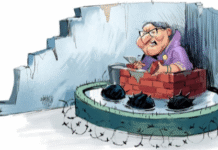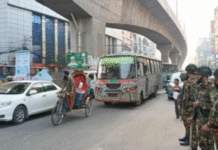The enduring capacity of Old Dhaka’s chemical warehouses

The Dhaka Tribune
Immediately after the fire, authorities made a great show of sealing and evicting the warehouses, disconnecting utility lines and emphasizing that not an inch would be yielded
It would appear that moving hazardous chemical and plastic warehouses out of the decrepit cloisters in Old Dhaka is as difficult as disciplining Bangladesh’s road transport sector.
In spite of numerous zealous raids and operations, and despite orders from the highest echelons of the government to remove all hazardous warehouses and stockpiles from the residential areas, the businesses are still running strong.
On the night of February 20 last year, the eve of Ekushey February, an explosion from a CNG cylinder blew into a vast fire due to the stockpile of flammable chemicals and plastics nearby, leading to the tragic death of 69 people in Old Dhaka’s Chawkbazar.
Immediately after the fire, authorities made a great show of sealing and evicting the warehouses, disconnecting utility lines and emphasizing that not an inch would be yielded.
But in a turn of events similar to many regulatory roll-outs and roll-backs in Bangladesh, the raids have stopped, the locks were unlatched, and the warehouses have continued with stockpiling.
On October 22, the Cabinet Division decided that a combined operation would proceed under a joint task force to remove all stockpiles of flammable substances including chemical or plastic factories and warehouses from the residential area, many of which are unlicensed. A long-term plan was also developed, which included taking action against the illegal businesses, and relocation of the legitimate businesses.
City authorities met with several other bodies on January 8 to discuss how to implement the decisions made at the top level of government, but appear to be indecisive about proceeding with implementation before a new mayor is elected in the February 1 polls.
Several officials familiar with the meeting said that even though they are eager to remove the lethal substances, the decision must be made by the mayor. It was not explained whether Sayeed Khokon, who recently stepped down as the mayor of Dhaka South City Corporation (DSCC), ever decided to the contrary.
Just days after the Chawkbazar fire, standing atop the ashes, Sayeed Khokon warned that anyone found stockpiling hazardous chemicals will be prosecuted. In a gesture that his agency’s activity (or lack thereof) has rendered symbolic, he helped carry drums of chemicals out of basement warehouses.
The DSCC and the Rapid Action Battalion (RAB) accompanied mobile courts on inspections of buildings, sealing them when necessary. But authorities now say that even though the operations got to a good start, the mayor and councillors were often away on political campaigns, leaving the work to die down and leading to the re-opening of many warehouses.
On March 2 last year, the DSCC sealed four chemical and plastic warehouses at 8/3, 8/ka, 16/2, and 16/2/B on Joynag Road in Bakshibazar. But a recent visit revealed that the ground floors of 8/3 and 16/2 have been turned into plastic factories which house hazardous chemicals, thus keeping alive the risk of fire threats in Old Dhaka.
The Chawkbazar fire was not the first or the last, but merely one that appeared to finally compel the authorities into action. A decade ago, another fire in nearby Nimtoli killed 124 on June 3, 2010. And on December 11 last year, a fire at three chemical warehouses in Keraniganj killed 27.
According to a report by the Bangladesh Poribesh Andolon (Bapa), there are over 25,000 warehouses or factories housing or producing 200 different hazardous substances in Old Dhaka. Among them, at least 15,000 are situated in residential buildings.
Bapa General Secretary Sharif Jamil told Dhaka Tribune: “If humans are exposed to these hazardous chemicals over time, they are going to be poisoned. And the risk of fire is always there. Neither the government nor the businesses are taking the responsibility. They should be removed as soon as possible.”
Md Sarwar Alam, an executive magistrate with RAB, condemned the practice of stockpiling hazardous chemicals in residential areas, calling it a social blight and urging for social pushback against it.
The DSCC has said it wants to issue the clearances issued by the Department of Explosives, Department of Environment, the fire service, and similar bodies when it comes to the businesses at risk. But the government agencies have not issued any clearances in the last 10 years.
Caught in a dilemma, the DSCC’s only weapon is to sever utility lines.
The Department of Inspection for Factories and Establishments (DIFE), the regulator most directly associated with the issue, remains far from it.
DIFE Joint Inspector General Shamsul Alam Khan said it is not possible to carry out operations due to scarcity of manpower.
Hafez Harun-Or-Roshid, former general secretary of Bangladesh Plastic Byaboshayee Samity and an FBCCI director, said that the affected businesses in Old Dhaka continue to stockpile and sell around 37 different kinds of hazardous chemicals which have great public use.
He stressed that the government should have detailed plans for relocating the businesses.
On April 20 last year, the Ministry of Home Affairs and several other agencies agreed that these businesses would be moved to Kamrangirchar and Keranjiganj. Till date, nothing has been done to materialize the said plan.
Farid Ahmed, owner of M/S Farid Enterprise, a chemical supplier whose warehouse was sealed by the authorities, claimed he had been framed.
“I have been set up. Did they find any toxic chemicals in the soil? I am being framed.”










